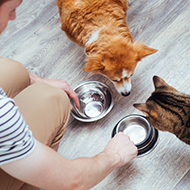Pet ownership rise sparks cat and dog food shortage

The PFMA has reassured pet owners that manufacturers are working hard to remedy the situation..
Supermarkets are warning that a rise in pet ownership during lockdown has led to a “national shortage” of dog and cat food.
Sainsbury's issued a message, shared by journalist Owen Jones on Twitter, indicating the problem could last all year.
The message said: 'Due to a national shortage of dog and cat food pouches, we're sorry if you're not able to find your usual product at Sainsbury's. We're working hard to resolve this. We think the issue will be ongoing throughout the year, but we hope to get them onto shelves as quickly as possible.'
Waitrose, Morrisons and Tesco have also seen a surge in demand for cat and dog food pouches, BBC News reports.
A Morrison spokesperson said: "We're working closely with our suppliers who are investing in increasing their capacity and we may not have full availability for several months. We do have enough stock to support all our customers and their new pets and so there is no need for people to buy more than they need."
There has been a significant spike in pet ownership during COVID-19. A survey by the Pet Food Manufacturers Association (PFMA) found that 2.1 million people in the UK collected a new pet in lockdown, while 1.8 million are thinking about adding a new pet to their household.
The PFMA said it was aware some retailers are currently experiencing shortages but stressed there is a good supply of pet food in all other formats. It added that Britain's Exit from the EU may have also been a contibuting factor to the supply issue.
PFMA deputy chief executive Nicole Paley said: “We appreciate that some pet owners will be concerned if they are unable to buy their pet’s favourite food, but please rest assured, pet food manufacturers are working hard to remedy this as soon as possible. We encourage pet owners to continue to shop sensibly and only to buy what is needed so as not to cause unnecessary peaks in demand.”
Helen Warren-Piper, general manager of Mars Petcare UK, said: "We recognise retailers are experiencing unusual demand for pet food during lockdown. We have made a significant investment into our manufacturing network - including investment in our UK Melton pet food plant."
A Purina spokesperson commented: "We are experiencing unprecedented demand for our products, including cat food pouches where we have seen sales growth for our Felix and Gourmet brands at almost three times that of the market. We have been working hard to meet this additional demand and are producing more pet food - including pouches - than ever before."



 The Veterinary Medicines Directorate (VMD) is inviting applications from veterinary students to attend a one-week extramural studies (EMS) placement in July 2026.
The Veterinary Medicines Directorate (VMD) is inviting applications from veterinary students to attend a one-week extramural studies (EMS) placement in July 2026.